Iran Plans Union of 'Martyrs’ Foundations' With Iraq, Lebanese Allies
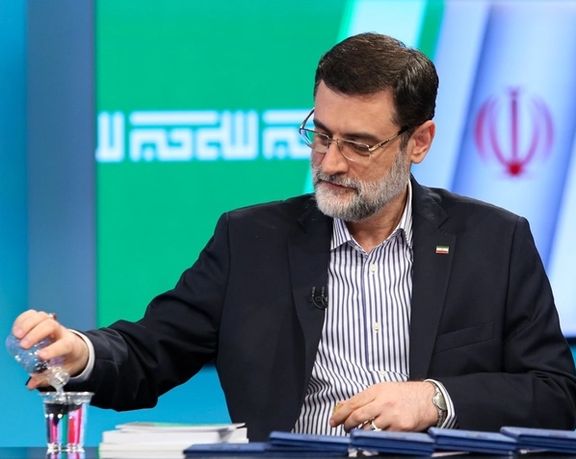
Despite recent criticism over a deal between Iran and Iraq martyrs’ foundations, Tehran plans for a regional union of similar entities in Iraq and Lebanon.

Despite recent criticism over a deal between Iran and Iraq martyrs’ foundations, Tehran plans for a regional union of similar entities in Iraq and Lebanon.
In his speech before the sermons at Tehran Friday prayers, the head of Iran’s Foundation of Martyrs and Veterans Affairs, Amir-Hossein Ghazizadeh Hashemi, said he wanted to establish the “Union of Martyrs’ Foundations of the Resistance Axis.”
This would include Iranians and Iraqis killed in the 1980-88 war, as well as those killed in the ‘resistance axis’ of Iran-backed militias, including Palestinian and Iraqi groups, and Hezbollah in Lebanon. Estimates of deaths in the 1980-88 war have ranged from 500,000 to 1 million.
Ghazizadeh said that “so far Lebanon and Iraq have announced their readiness.” He praised the “the axis of resistance” as “a symbol of self-sacrifice” and called on Iranians to “stand with our dear brothers…committed to the culture of the revolution around the world.”
The Iraqi martyr’s foundation is run by the government, while in Lebanon the Martyrs Foundation is a Hezbollah support network sanctioned by the United States. There is also a Palestinian martyrs foundation in Lebanon.
Earlier in March, Ghazizadeh signed a deal to provide a wide range of services to Iraqi veterans, including those from the Iraq-Iran war, drawing criticism and calls for his resignation from Iranians and veterans who say Iran can barely provide the needed services for its own veterans and their families
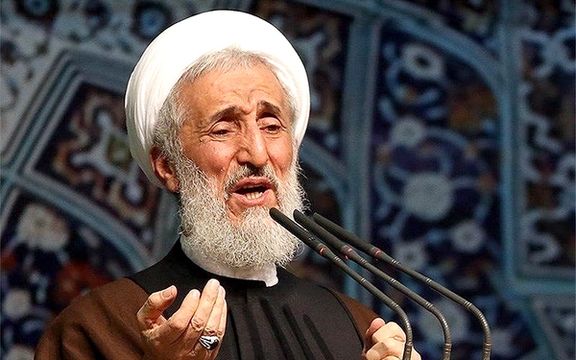
Friday prayer Imams in Iran have defended the government for not opposing Russia's invasion of Ukraine, saying Kyiv was pro-West and not friendly toward Tehran.
Ayatollah Reza Ramezani, a supporter of Ali Khamenei, claimed on Friday Iran has never directly backed Russia's invasion of Ukraine, although Kyiv has always maintained positions against Tehran.”
The cleric who was previously in charge of the Shiite mosque in Hamburg, Germany, charged that "Ukraine's government has always supported the demands of arrogant powers," adding that "we abstained from voting to condemn Russia at the United Nations" for its invasion of Ukraine.
Earlier this week, Russia's ambassador to Tehran Levan Dzhagaryan (Jagaryan) told Iranian reporters to use the term "special military operation", rather than the word "war" or “invasion” about the Russia’s attack on Ukraine. Many Iranian intellectuals and reporters called on the foreign ministry to summon the ambassador and tell him that he is in no position to boss around Iranian reporters.
Reformist figure Mostafa Tajzadeh wrote in a tweet: "Iranians still remember the bitter experience of Saddam Hussain's war and his aggression against Iran as a neighboring country. For this, Iranians condemn the military attack" on Ukraine.
Tehran's Friday prayer Imam Kazem Sediqi also said on Friday that Ukraine gave Iranian leaders a hard time when Iran downed a Ukrainian civilian airliner in January 2020. An IRGC unit fired two missiles at the plane taking off from Tehran killing 176 civilian passengers and crew members.
Trying to justify Iranian leaders' support for Russia's invasion, Ramezani said: "We are against war and violence, but the Islamic Republic needs to adopt positions in the international scene based on rationality.”
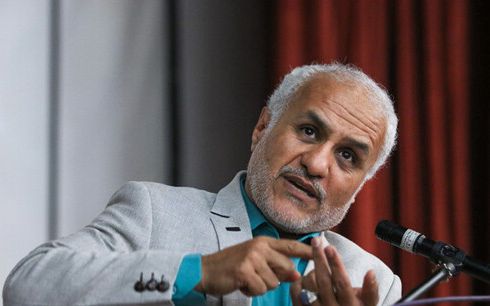
In the meantime, according to Etemad Online website, Russia's supporters in Iran have been beating on the drums of conflict. Hassan Abbasi, a zealot fundamentalist commentator has once again on Friday called for turning the White House into a mosque, imposing compulsory hijab on American women, and converting westerners into Islam. Abbasi also said that "The war between East and West can have only one winner, and that will be Iran!"
Also on Friday, as nuclear talks between Iran and world powers stopped because of Russian demands, journalists and commentators as well as other social media users blamed Russia and Iranian leaders' support for Moscow for the deadlock.
Political analyst Jamshid Barzegar wrote on Twitter: "As it was predictable, Iranian leaders refused to resist Russia probably because they were unable to do so. The Vienna talks have been stopped without any result not based on Iran's national interests, but because Moscow wanted the talks to collapse. Iran is suffering because of Putin and its own ruling clerics."
Iranian journalist Milad Alavi also wrote: "The Vienna Talks have been suspended and history will witness that a regime whose motto was neither East, nor West, imposed sanctions on its own people for the sake of Russia's interests."
Ironically, Ramezani the cleric who is a member of the Assembly of Experts, told Iranian reporters in an interview on Friday that the negotiations have reached a good point.
The pause in nuclear talks for the time being puts an end to all hopes of a breakthrough that could relieve Iranians from the backbreaking pressure of sanctions. This comes while even Russian President Vladimir Putin has acknowledged that because of sanctions on Russia's oil, the US is prepared to give countries including Iran and Venezuela special treatment to make sure that they replace Russia in the oil market.
Some Iranian political figures and analysts had also suggested during the past week that Iran should seize the opportunity to mend its ties with the United States and sell its oil at high prices after several years of sanctions on its oil export and international banking.
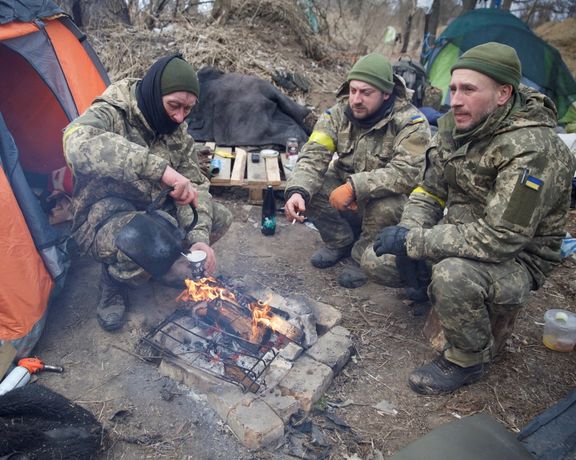
Two former Iranian presidents have condemned the Russian invasion of Ukraine despite to government’s position of tacitly supporting Moscow and blaming the West.
In a message published Thursday Khatami described Russia’s intervention as “an invasion of a free territory by a foreign power.”
Khatami, reformist president from 1997 to 2005, said that “regardless of the causes of this unfortunate situation… what is happening in Ukraine is…the repression of a nation that has shown, especially in these days, that it wants to live freely and independently.”
Before him, another former president, Mahmoud Ahmadinejad, had praised Ukraine’s “unrivalled resistance” and rebuked Iran’s leadership, since Iran − like China, India, and the United Arab Emirates − has abstained in United Nations votes condemning the Russian invasion.
Addressing the “great nation of Ukraine” and its president, Volodymyr Zelenskyy, Ahmadinejad said, “Your honorable and almost unrivalled resistance uncovered the Satanic plots of enemies of mankind.” Ahmadinejad, ‘principlist’ president from 2005 until 2013, tweeted: “Trust that the great nation of Iran is standing by you, while admiring this heroic persistence.”
A lively debate about Russia’s invasion of Ukraine continues in Iran, with divisions reflecting wider disagreements among various factions over foreign policy. While reformists have been more critical of Russia, and many Iranians have condemned Russia, supporters of Supreme Leader Ali Khamenei have been sympathetic to Russia’s position and accused the US and NATO for provoking Russia.
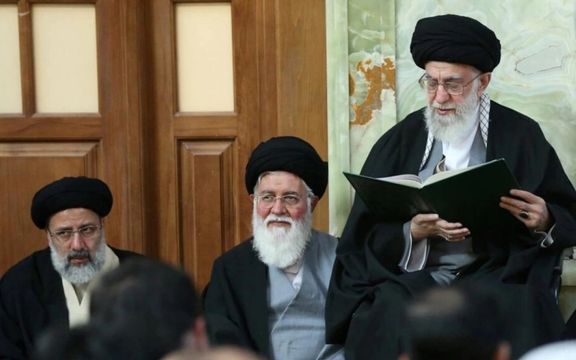
Ahmad Alamolhoda, a senior firebrand cleric who is father-in-law of President Ebrahim Raisi (Raeesi), has urged people to reproach women with poorly-fitting hijab to stop “debauchery.”.
“It is not possible to confront these people with the police and weapons,” said Alamolhoda, who is Supreme Leader Ali Khamenei’s representative in the shrine city of Mashhad. “If a woman in the street removes her headscarf, she must face the complaints of the people to see that she has no place…In such a case, you can be sure that she will wear even two scarves."
Alamolhoda said that law enforcement forces, including the morality police charged with regulating public behavior including dress codes, were not a solution “and even make the situation worse.”
He cited Kamenei as ordering “to fire at will”, metaphorically giving a green light for religious zealots to confront women in the streets, which sometimes leads to physical attacks.
Despite the cleric’s ruling out “weapons,” at least eight acid attacks in Esfahan in 2014 carried out by vigilantes were blamed by some, including Hadi Ghaemi of the US-based International Campaign for Human Rights in Iran, on calls from conservative figures for more ‘Islamic’ standards in dress codes. Alamolhoda spoke out on the issue in January, suggesting that that loose-fitting hijab should not be accepted in public.
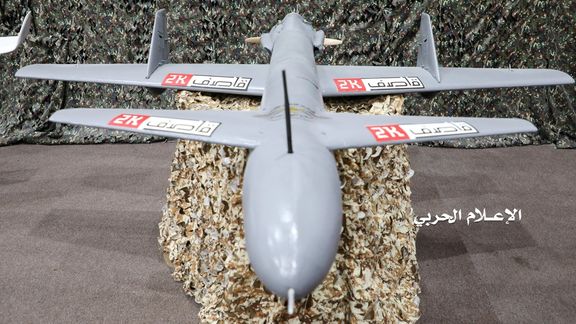
A drone hit a refinery in Saudi Arabia's capital, Riyadh Thursday morning but oil supplies were not affected, Saudi state news agency SPA reported on Friday.
The attack caused a small fire that was controlled and did not result in any injuries or casualties, SPA said citing a statement by an energy ministry official.
"The refinery's operations and supplies of petroleum and its derivatives were not affected," the statement said.
It did not specify where the attack originated from.
The world's top oil exporter has faced frequent missile and drone assaults by Yemen's Iran-aligned Houthi group that has been battling a coalition led by Riyadh for seven years.
The Houthis have not announced any strikes against the kingdom in recent days and the Saudi-led coalition had not issued a statement regarding Thursday's incident.
"These repeated acts of sabotage and terrorism on vital installations and civilian structures ... do not just target the Kingdom but aim to undermine the security and stability of global energy supplies," the statement said.
Saudi Arabia accuses Iran of arming the Houthis and has blamed Tehran for past attacks including a 2019 strike on oil plants. Tehran denies doing so.
The conflict is widely seen in the region as a proxy war between Saudi Arabia and Iran.
Reuters report

(Reuters - Analysis) - By single-handedly knocking 13% off rocketing oil prices on one day this week, the United Arab Emirates showed the power of Persian Gulf producers in the market and sent a wake-up call to Washington to pay closer attention to its longtime allies.
OPEC heavyweights Saudi Arabia and the UAE, which both bear grudges against Washington, have snubbed US pleas to use their spare output capacity to tame rampant crude prices which threaten global recession after Russia's invasion of Ukraine.
Wednesday's sharp oil price fall, the biggest one-day drop in almost two years, followed comments by the UAE ambassador to Washington, who said his country supported pumping more oil.
Prices rebounded when the UAE energy minister contradicted him and said the Gulf state stuck by an output pact agreed with OPEC+, which groups the Organization of the Petroleum Exporting Countries and its allies, including Russia.
"This was deliberate," Gulf Research Center Chairman Abdulaziz Sager said of the conflicting UAE comments, adding that the message being sent to Washington was: "You need us, we need you, so let's settle the issues between us."
He said Washington, which flagged Russia's plans to invade Ukraine long before Moscow's troops crossed the border on Feb. 24, should have coordinated more closely with Arab producers in the buildup, rather than turning to them once the crisis hit.
"Gulf states have over many years built a good relationship with Russia, they cannot just overturn things," he said.
The United States wants the Persian Gulf Arab producers to side with the West over the Ukraine crisis but Washington has eroded its political capital with Riyadh and Abu Dhabi by not heeding their concerns about regional rival Iran, ending its support for their war in Yemen and slapping conditions on US weapons sales to them.
REBUILDING TRUST
Saudi Crown Prince Mohammed bin Salman was incensed by President Joe Biden's refusal to deal directly with him as the kingdom's de facto ruler because of the 2018 murder of Saudi journalist Jamal Khashoggi. A US intelligence report implicated the prince, who denies any role.
"There are many problems between the US and its Gulf allies that need to be addressed widely and resolved," said a regional source, saying trust needed to be rebuilt. "It has nothing to do with Russia or the Ukraine war."
The source said Washington should have acted before the Russian invasion. "The US administration knew it was heading towards a crisis. They should have fixed relations with their allies, coordinated and lined them up in advance ... not just expect them to comply and handle oil prices."
Mistrust has built up since the 2011 Arab uprisings when Persian Gulf Arab rulers were shocked at how the administration of President Barack Obama abandoned the late Egyptian President Hosni Mubarak after a 30-year alliance, allowing him to fall and ignoring their concerns over the rise of the Muslim Brotherhood.
Sunni Muslim countries in the region also felt blindsided when Washington reached a nuclear deal with Shi'ite Iran in 2015 that did not tackle Gulf concerns about Tehran's missiles program and regional proxies in Yemen, where the Gulf neighbors have been embroiled in war, and Lebanon, now deep in crisis.
Saudi Arabia felt particularly spurned in 2019 when missile and drone attacks on the kingdom drew a lukewarm US reaction, although Riyadh and Washington both blamed Tehran. Iran denied having a role.
The UAE felt equally frustrated in January when Yemen's Houthis launched attacks on Abu Dhabi. Despite UAE calls for Biden to reinstate a terrorist designation for the Iranian-backed group, Washington has yet to do so.
PHONECALL SNUB
The Gulf source and another source familiar with the matter told Reuters that Biden had irked UAE de facto ruler Abu Dhabi Crown Prince Mohammed bin Zayed, known as MbZ, by not calling swiftly after the Houthis struck.
"Biden called him three weeks after. MbZ didn't take the call. Your ally comes under a terrorist attack and you wait three weeks to call?" the source said.
White House National Security Council spokesperson Emily Horne said on Wednesday there had been "no issues with having a call" and Biden would speak with the UAE leader soon. A UAE foreign ministry spokesperson said a call was being scheduled.
Last month, Biden spoke with Saudi's King Salman while the crown prince, known as MbS, was in the room. Sources said Biden had asked to speak with the crown prince but MbS declined because the call had only been scheduled with the king.
The White House and Saudi government did not immediately respond to a Reuters requests for comment on the episode. The White House told a briefing on Monday there were no plans "at this point" for Biden to call MbS.
The Ukraine crisis has erupted as the United States, Russia and other world powers have been in talks to revive the nuclear pact with Iran. But Moscow may have derailed those efforts for now by demanding guarantees from Washington that Western sanctions on Russia do not affect its business with Iran.
Regional Sunni Arab states have long felt their concerns have not been addressed in those talks, fearing a deal will empower Iran and its regional proxies.
Persian Gulf oil producers are still likely to side with the United States, which they depend on for their security, over their ties with Russia that focus on energy and business.
"Ultimately, the US does have clout, but the Saudi and Emirati resistance threshold is particularly high at present, given their deep dissatisfaction with US policy towards them," said Neil Quilliam, associate fellow at Chatham House.